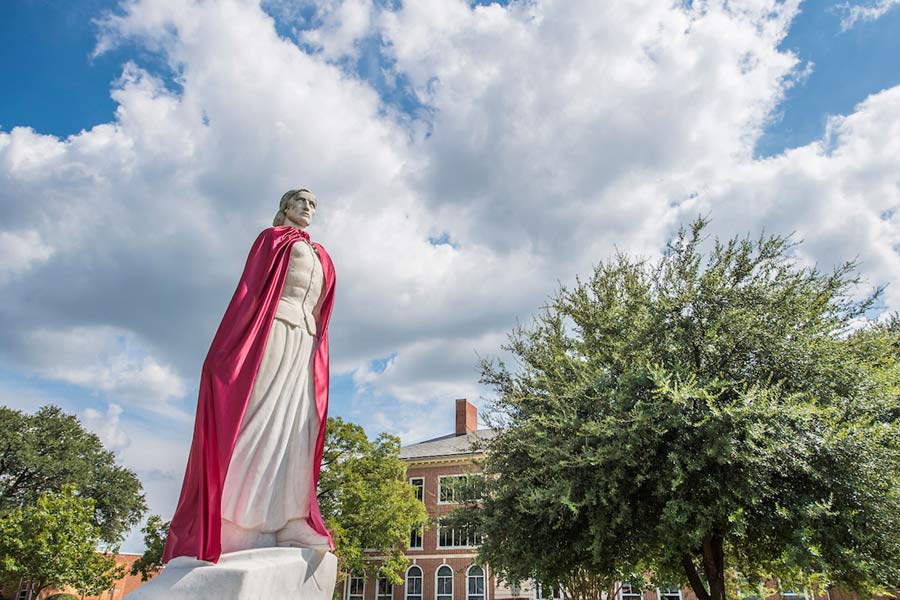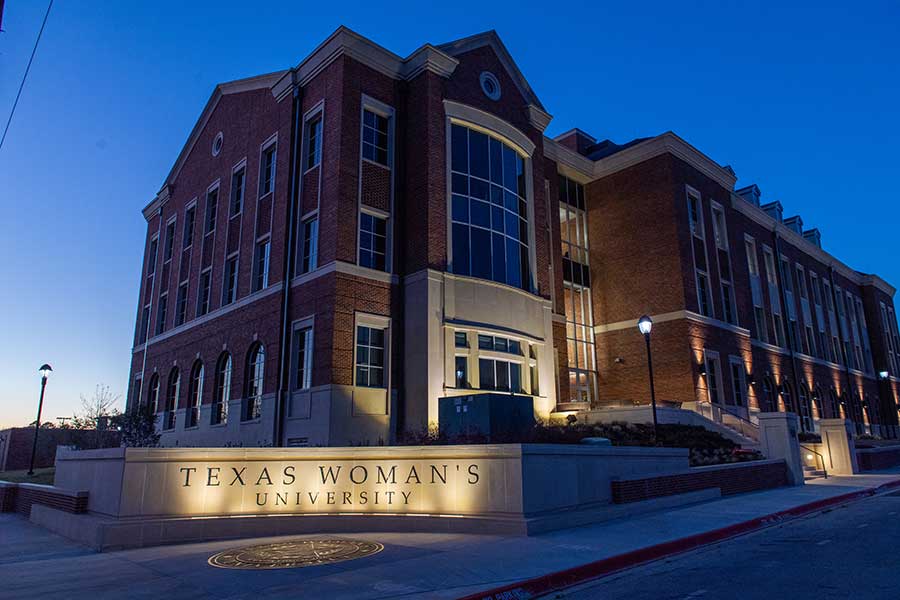TWU Distinctions

Created in 1901 by the 27th Texas State Legislature, Texas Woman’s University (TWU) has become known for its contributions and leadership in the fields of education, nutrition, the arts, sciences, and especially in the nursing and health care professions.
TWU offers the student services, faculty support and campus esthetics more typically found at a private university. The university believes in a quality education that is affordable and accessible, which is why it offers more than $15 million in scholarships annually.
In 2014, The Chronicle of Higher Education cited Texas Woman’s as the fifth-fastest growing public doctoral university in America (55 percent growth from 2003 to 2013). It is the only university in the Lone Star State to offer doctoral degrees in occupational therapy, physical therapy, dance and women’s studies. About 12 percent of the university’s nearly 16,000 students are men, who have been admitted to the University’s graduate programs since 1972 and undergraduate programs since 1994.
TWU prides itself on providing students with a well-rounded educational experience focused on service, health and well-being, and integrity. Respect for diversity in all dimensions (U.S. News & World Report ranks the university in the top 10 in the nation for diversity) and a safe campus environment (TWU is among the safest campuses in the nation) are among the hallmarks of a TWU education. The university also is nationally recognized as Military Friendly.
TWU’s main campus is in the booming North Texas college town of Denton, just 40 miles from the Dallas-Fort Worth Metroplex and consistently named one Texas’ and the nation’s best college towns. It also has health sciences centers in Dallas’ prestigious Southwestern Medical District and the world’s largest medical center in Houston (Texas Medical Center).

The University offers more than 60 programs of study with a total of 110 undergraduate and graduate degrees (bachelor’s: 43, master’s: 47 and doctoral: 20) in traditional, online and hybrid formats. Nearly 60 percent of Texas Woman’s University students take at least one online course, and one-fourth of its graduate students only take online courses.
TWU faculty and staff are passionate defenders of a “learn by doing” experiential learning environment where they provide students with opportunities to engage in campus, workplace and community activities that can help shape their sense of purpose, their appreciation for the importance of building quality personal and professional relationships, and their ability to address life’s challenges.
This holistic, mentoring approach to developing students as engaged, productive citizens in this complex world of the 21st Century encompasses understanding of the balance of health, spiritual and mental well-being.
The Economist magazine ranks Texas Woman’s University No. 45 in the nation and No. 2 in Texas out of 1,275 universities for maximizing students’ earning potential. The median first-year earnings of TWU bachelor’s degree graduates are the second highest among Texas public universities. Some 85 percent of TWU’s bachelor’s degree graduates are employed or enrolled in graduate school within one year of graduation, and 80 percent of students who complete a graduate degree are working in Texas within one year of graduation.
In its more than 115 years, the University has achieved national acclaim in a number of academic programs, from nursing and nutrition to physical therapy, occupational therapy, and library and information studies.
After creating the state’s first home economics labs in the early 1900s, University nutrition faculty led bone density research with NASA during the first space missions and, more recently, created publicly available food safety training and informational videos and materials in English and Spanish designed to help reduce food-borne and allergy illness as part of a national grant from the U.S. Department of Agriculture. TWU also is the first university in Texas to offer a Culinology® degree program, which provides students an opportunity to combine both culinary arts and food science training. This certification program provides the food industry with product development employees.

TWU faculty also developed the treatment model now taught globally in occupational therapy. Texas Woman’s is the only university in the state with Adapted Physical Education master’s and doctoral degree specializations. In addition, the University is home of Texas’ first TeachLivE™ lab, where teacher candidates practice their skills on student avatars.
In 2015, the University established two new centers that already are gaining important traction. TWU’s new center for women in business is focused on helping Texas achieve its goal of being No. 1 in the United States for women-owned businesses. In addition, the university’s new Woodcock Institute for the Advancement of Neurocognitive Research and Applied Practice is pursuing interdisciplinary research into the cognitive profiles of individuals with diagnosed exceptionalities (learning disabilities, neuropsychological conditions, behavioral and psychiatric disorders and giftedness).
Texas Woman’s also is one of only 19 Reading Recovery university training centers in the U.S. Reading Recovery is the world's most widely researched intervention for young children having extreme difficulty with early literacy learning. TWU’s Reading Recovery faculty have contributed to communities in six states by training more than 35,000 Reading Recovery teachers, teaching nearly 300,000 Reading Recovery students, and more than 17,000 Descubriendo la Lectura (the Spanish version of Reading Recovery) students.

TWU’s music therapy program is the oldest ongoing program in Texas and one of the first programs of its kind in the U.S. Promising external national research suggests that music therapy may have a role to play in minimizing the effects of stroke and helping to improve stroke patients’ quality of life. Texas Woman’s Dallas campus also is home to The Stroke Center, which offers innovative brain-based treatments for aphasia following stroke.
Eight women who taught visual arts at the university from the Roaring 20s through the 70s today are considered the “Pioneers of Modernism Art” in Texas. Today, TWU visual arts faculty and students continue to receive national recognition for their work. TWU also established Texas’ first department of music in 1915, and a century later, TWU’s music students perform across the U.S., including at the Kennedy Center and Carnegie Hall.
TWU faculty research, often conducted with students, affects the lives of Texans and others. Whether it’s developing programs to reduce violence against women around the world, working with veterans and their families, expanding access for children with autism or identifying more effective ways to treat cancer cells, faculty are working to improve lives and make a difference.
Page last updated 9:41 AM, October 17, 2023